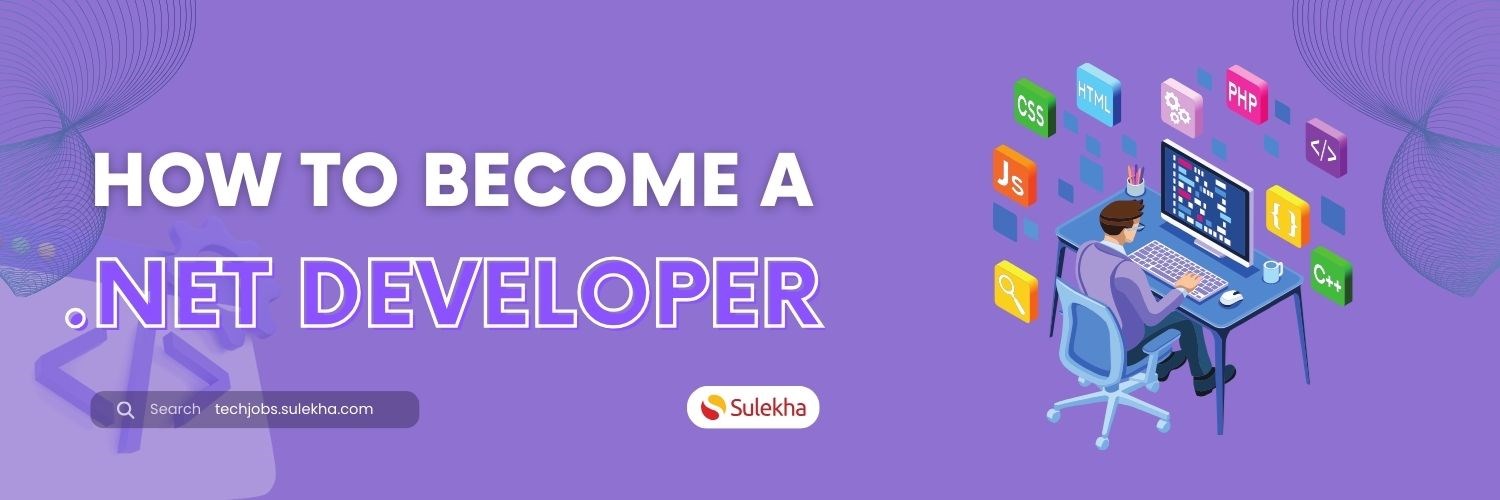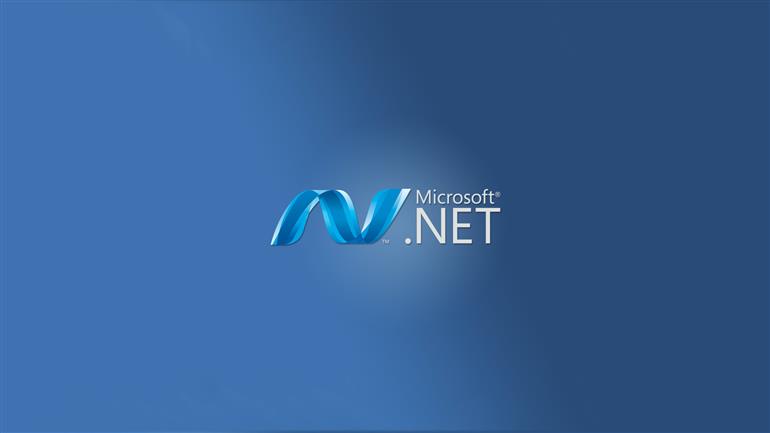How to become a Dot Net Developer

How to become a .NET Developer
Are you interested in pursuing a career as a .NET developer but unsure where to start? With the growing demand for custom web applications and the versatility of the .NET platform, now is an excellent time to embark on this rewarding career path. In this blog post, we'll guide you through the key steps to becoming a proficient .NET developer.
What is .NET?
.NET is a free and open-source application platform supported by Microsoft. It is a secure, reliable, and high-performance application platform with a rich array of languages, editors, and libraries to build for web, mobile, desktop, games, and IoT. .NET is supported on various operating systems such as Android, Apple, Linux, and Windows. It includes a standard set of libraries and APIs for tasks ranging from collections to networking to machine learning.
Additionally, .NET is open source under the .NET Foundation, an independent organization that fosters open development and collaboration within the .NET ecosystem and provides a robust support system for developers.
How to Become a .NET Developer?
The job outlook for .NET developers in the USA is not just positive; it's thriving. With a projected growth rate of 13% from 2018 to 2028, approximately 20,900 new jobs for .NET developers will be created over the next decade. This increasing demand for .NET developers is not a temporary trend. Still, it reflects the growing need for custom web applications that cater to specific business requirements, ensuring a stable and promising career path for aspiring developers.
According to Glassdoor, the average salary for a .NET developer in the United States is $130,199 per year.
Step 1: Educational Qualifications
To become a .NET developer, a bachelor's degree in computer science or a related field is beneficial, it is not always a requirement. However, having a technical background can help one understand the fundamentals of coding and languages.
Step 2: Know the Basics
Second step you need to become a .NET developer is developing a strong foundation in programming languages like C#, C++, F#, and VB.NET, which is essential for creating applications on the .NET platform. Additionally, focus on mastering skills such as SQL, Visual Studio IDE, communication skills, cloud computing, machine learning, web development, and front-end technologies like JavaScript, HTML, and CSS. Moreover, you must have a profound understanding of fundamental concepts like:
.NET Core
.NET Standard
.NET Framework
Xamarin
If you intended to learn C# programming language, it would be an added advantage, and you should master the core skills, which include:
• Variables
• Conditionals
• Loops
• Fields and properties
• Data types
• Inheritance
• Objects
• LINQ
• Classes
• Methods
• Encapsulation
• Interfaces
• Polymorphism
Step 3: Specialization Courses and Certifications
To become a .NET developer, consider enrolling in specialized courses and certifications to broaden your perspectives and enhance your skills. These courses can provide a deeper understanding of the .NET platform and its various possibilities for application development.
If you intend to take a .Net course, visit the Sulekha website. There, you can find a variety of training providers, including those specializing in .NET development. Sulekha offers many IT training providers, including those for .NET development. You can find experienced trainers available for flexible training batches at your convenience.
Step 4: Gain Practical Experience
Gaining practical experience as a .NET developer can be achieved through internships, entry-level positions, coding challenges, hackathons, and contributing to open-source projects to build a portfolio and showcase skills.
Engage in work projects, freelancing opportunities, or internships to apply your knowledge in real-world scenarios. Practical experience sets you apart from beginners and provides valuable insights into the daily work of a .NET developer.
Step 5: Continuous Learning and Upskilling
Stay focused on upskilling yourself, improving your soft skills, exploring additional skills, and embracing new opportunities and challenges in the professional space.
Following these steps and continuously honing your skills, you can embark on a successful career path as a .NET developer, leveraging the diverse opportunities and advancements within the .NET ecosystem.
What Fields of work you can select as a .NET developer?
Web Development in DOTNET
Building a website with HTML5, CSS, and JavaScript is challenging, but acquiring a profound understanding of .NET framework helps you build efficiently. DOTNET developers consider it the most effective server-side scripting technology, versatile and functional.
The primary responsibilities of DOTNET developers in building websites and apps include:
1. Upgrade, configure, and debug existing systems
2. Write clean codes using .NET languages
3. Providing tech support for websites, computer programs, or mobile apps.
Head in the Cloud
As a .NET developer with cloud skills, you can take on various responsibilities in the cloud computing domain. You can design, develop, and maintain automated cloud solutions, assist with technical design, and support cloud infrastructure and services.
Your role may include managing databases, writing SQL queries, and optimizing database performance in the cloud2. You can also develop cloud-native applications using the .NET framework and cloud services like Azure, AWS, and Google Cloud Platform. Additionally, you can implement DevOps practices like continuous integration, delivery, and monitoring for .NET applications in the cloud.
You can also automate cloud deployments of .NET applications using tools like Azure DevOps, AWS CodePipeline, and Google Cloud Build.
Mobile-first Mindset
A Mobile-First Mindset with .NET skills involves designing and building applications focusing on mobile devices first, considering mobile platforms' unique constraints and opportunities. This approach ensures the application is optimized for mobile users, providing a seamless and engaging user experience.
As a .NET developer, adopting a Mobile-First Mindset involves several responsibilities, such as:
1. Designing and developing applications that are optimized for mobile devices, ensuring a seamless user experience on smaller screens.
2. Prioritizing mobile functionality and performance in the development process, considering load times and responsiveness factors.
3. Implement responsive design techniques to ensure applications adapt to different screen sizes and orientations.
4. Testing applications thoroughly on various mobile devices to ensure compatibility and functionality across different platforms.
5. Staying up to date with the latest trends and technologies in mobile development to continuously improve and optimize applications for mobile users.
6. Collaborating with designers, developers, and stakeholders to ensure that the mobile-first mindset is integrated into all aspects of the development process.
7. Monitoring and analyzing user feedback and behavior to identify areas for improvement and enhance the overall mobile user experience.
Microservice Development
The scope of Microservice Development with .NET skills offers .NET developers the opportunity to design, build, and maintain scalable and modular applications in the cloud environment.
As a .NET developer in the cloud, responsibilities may include designing microservices architecture, developing independent and interoperable services, implementing API gateways for client communication, managing service discovery for efficient routing, ensuring security practices for data protection, and deploying microservices using cloud platforms like Azure, AWS, or Google Cloud.
By embracing a Microservice Development approach with .NET skills, developers can enhance application scalability, flexibility, and maintainability while leveraging cloud technologies to deliver robust and efficient solutions in the modern software development landscape.
.NET Developer Skills
Top companies like Wells Fargo, Microsoft, Citi, and Bank of America seek skilled employees in C#, ASP.Net, ASP.Net Web API, REST API/JSON, LINQ, SQL, and relational databases. Moreover, you should develop skills like OOD, Agile, multi-threading, performance tuning, good code organization skills, and design patterns.
Basic Coding Skills
As we discussed before, C# and its core concepts are crucial. Moreover, as a .Net developer, you should acquire OOPS (Object-oriented Programming Concept) knowledge. These two skills help in web, app, mobile, and game development. These skills help you step closer to a bright career in the .NET world.
Tools for Productivity
1. Visual Studio: The primary integrated development environment (IDE) for .NET, offering robust features like IntelliSense, debugging, and project templates.
2. ReSharper: A popular Visual Studio extension that provides advanced code analysis, refactoring, and navigation tools.
3. Azure DevOps: A cloud-based service that supports agile planning, CI/CD pipelines, and collaborative code repositories for .NET projects.
4. Entity Framework: A powerful ORM tool for working with databases, simplifying data access and manipulation in .NET applications.
5. GitHub: A version control and collaborative development platform that integrates well with Visual Studio and Azure DevOps
Principles and Patterns
Principles of .NET:
1. Object-oriented programming
2. Interoperability
3. Language independence
4. Security
5. Performance
Patterns of .NET:
1. Model-View-Controller (MVC)
2. Repository pattern
3. Dependency Injection
4. Factory pattern.
5. Observer pattern
These skills are essential to grow your .NET developer career.
Frameworks of .NET
.NET offers developers a variety of flavors to cater to different application development needs. The .NET Framework is the original version. .NET Core, on the other hand, is a cross-platform and open-source version optimized for modern cloud-based applications.
Xamarin is a framework that allows developers to create native mobile applications for iOS, Android, and Windows using C#.
ASP.NET is a web application framework within the .NET ecosystem. It offers MVC, Web API, and SignalR features for building dynamic, data-driven web applications and services.
Each flavor of .NET provides unique capabilities and advantages, allowing developers to choose the best platform for their development requirements.
Client-side Technology
.NET is primarily used for server-side processing in web applications, where the code is executed on the server before sending it to the client's browser. This allows for dynamic content generation based on the server's data and logic, providing a more interactive and personalized user experience.
Database Management
A developer's work involves dealing with a ton of data behind the scenes, so managing and storing it is crucial. Losing essential reports can be a real headache, and mishandling data could damage a developer's reputation. Employers seek professionals skilled at handling, storing, and organizing data. SQL, Oracle, and NoSQL are some tools that come in handy for that.
Which certifications and internships can help you become a .NET developer?
The most common certifications for junior .NET developers include:
i-Net+ Certification
Microsoft Certified Solutions Developer (MCSD)
These certifications can demonstrate a baseline of knowledge expected for the position and make you a more competitive candidate.
Moreover, when it comes to internship, consider joining a course like ASP.NET with C# and SQL Server, which covers ASP.NET, C # .NET, and concepts like ADO.NET. This course will help you develop a robust .NET application and prepare you for a career as a .NET developer.
In conclusion, to become a successful .NET developer, you must learn the programming fundamentals, master the .NET framework, and gain hands-on experience by building projects and contributing to open-source. Deepening your knowledge of essential tools like Visual Studio and frameworks like ASP.NET will enhance your productivity. Staying current with industry trends and networking with other developers will keep your skills relevant. With continuous learning and real-world practice, you can build a strong foundation for a thriving career in .NET development.
Find a course provider to learn .Net
Java training | J2EE training | J2EE Jboss training | Apache JMeter trainingTake the next step towards your professional goals in .Net
Don't hesitate to talk with our course advisor right now
Receive a call
Contact NowMake a call
+1-732-338-7323Take our FREE Skill Assessment Test to discover your strengths and earn a certificate upon completion.
Enroll for the next batch
.Net Core Training Courses
- Jan 28 2026
- Online
.Net Core Training Courses
- Jan 29 2026
- Online
.Net Core Training Courses
- Jan 30 2026
- Online
Related blogs on .Net to learn more

One Integrated Library coming soon for .NET developers!
Microsoft is planning to incorporate platform integration concept called "one library to rule them all." With Dot Net Standard, developers have to master a single base library to reach multiple Dot Net platforms

A career in DOT Net Programming | Its multifarious benefits and future scope
The IT sector is a highly promising industry with diverse employment opportunities. One of the core programming languages systems that drove the global growth of the IT industry is DOT Net programming.

What is the use of ‘Tag Helpers’ in ASP.Net 5?
Microsoft’s ASP.Net latest release aka ASP.Net 5 – aka ASP.Net vNext comes with several advancements and features that help to improve the techniques used for developing modern web applications. With more than 10 years of evolution, this ASP.Net is c

Peachpie lets PHP complied files to be executed in .NET framework
After the announcement of making .NET framework an open-source resource, Microsoft continued its open-source revolution by making its Roslyn complier technology an open-source resource too. This powerful compiler can enable the developer to compile c

More reasons to choose Net open-source framework!
Microsoft is a pioneer in software manufacturing and it never ceased to surprise the software community around the world.

.NET Framework in a Nutshell
.NET is a programming framework developed by Microsoft which allows developers to develop software applications more easily and efficiently. Starting from 1990, Microsoft has developed numerous versions of .NET framework. Framework is simply a bunch

A Comprehensive Look at the Career of a .NET Developer
The ASP.NET framework, developed and marketed by Microsoft, is a major framework for the development of applications and dynamic web pages. The increased accessibility to internet services around the world has resulted in numerous career opportunitie

Why ASP.NET Core 1.0 Has Replaced ASP.NET 5
World of information technology is extremely volatile and the technologies continue to evolve and change consistently. One of the web technologies “.NET” (dot net) introduced by Microsoft has also changed of late. The new technology; ASP.NET core now

Tick, Tick, Time to upgrade your .NET Framework!
Building idiot-proof software programs is a great deal and takes a lot of effort. Development frameworks like .NET are Indeed a great boon to the software developers.

Everything you needed to know about Dot Net
The .NET is a very large framework and sometimes is hard to decide whether to code something or use an existing component of the framework. An outline of whatever DOT NET offers is simple records. It is tough to keep in path since, .NET evolves very
Latest blogs on technology to explore

Drug Safety & Pharmacovigilance: Your 2026 Career Passport to a Booming Healthcare Industry!
Why This Course Is the Hottest Ticket for Science Grads & Healthcare Pros (No Lab Coat Required!)" The Exploding Demand for Drug Safety Experts "Did you know? The global pharmacovigilance market is set to hit $12.5B by 2026 (Grand View Research, 202

Launch Your Tech Career: Why Mastering AWS Foundation is Your Golden Ticket in 2026
There’s one skill that can open all those doors — Amazon Web Services (AWS) Foundation

Data Science in 2026: The Hottest Skill of the Decade (And How Sulekha IT Services Helps You Master It!)
Data Science: The Career that’s everywhere—and Nowhere Near Slowing Down "From Netflix recommendations to self-driving cars, data science is the secret sauce behind the tech you use every day. And here’s the kicker: The U.S. alone will have 11.5 mill

Salesforce Admin in 2026: The Career Goldmine You Didn’t Know You Needed (And How to Break In!)
The Salesforce Boom: Why Admins Are in Crazy Demand "Did you know? Salesforce is the 1 CRM platform worldwide, used by 150,000+ companies—including giants like Amazon, Coca-Cola, and Spotify (Salesforce, 2025). And here’s the kicker: Every single one

Python Power: Why 2026 Belongs to Coders Who Think in Python
If the past decade was about learning to code, the next one is about coding smarter. And in 2026, the smartest move for any IT enthusiast is learning Python — the language that powers AI models, automates the web, and drives data decisions across ind

The Tableau Revolution of 2025
"In a world drowning in data, companies aren’t just looking for analysts—they’re hunting for storytellers who can turn numbers into decisions. Enter Tableau, the #1 data visualization tool used by 86% of Fortune 500 companies (Tableau, 2024). Whether

From Student to AI Pro: What Does Prompt Engineering Entail and How Do You Start?
Explore the growing field of prompt engineering, a vital skill for AI enthusiasts. Learn how to craft optimized prompts for tools like ChatGPT and Gemini, and discover the career opportunities and skills needed to succeed in this fast-evolving indust

How Security Classification Guides Strengthen Data Protection in Modern Cybersecurity
A Security Classification Guide (SCG) defines data protection standards, ensuring sensitive information is handled securely across all levels. By outlining confidentiality, access controls, and declassification procedures, SCGs strengthen cybersecuri

Artificial Intelligence – A Growing Field of Study for Modern Learners
Artificial Intelligence is becoming a top study choice due to high job demand and future scope. This blog explains key subjects, career opportunities, and a simple AI study roadmap to help beginners start learning and build a strong career in the AI

Java in 2026: Why This ‘Old’ Language Is Still Your Golden Ticket to a Tech Career (And Where to Learn It!
Think Java is old news? Think again! 90% of Fortune 500 companies (yes, including Google, Amazon, and Netflix) run on Java (Oracle, 2025). From Android apps to banking systems, Java is the backbone of tech—and Sulekha IT Services is your fast track t